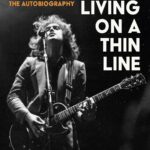Kinks fans have attained a certain level of understanding about Ray Davies through his songs. Younger brother and the band’s lead guitarist, Dave Davies; however, is more of a mystery.
The younger Davies’ latest autobiography, “Living on a Thin Line,” seeks to remedy that across 288 pages – sometimes hilarious, often harrowing – that recount a life on the road, in his big brother’s shadow and inside his own head.
“Being away from home, in a different city and hotel every night, might sound like fun, and it was for a while, but soon enough, it messes with your mind,” Davies writes at one point.
And Davies’ mind subsequently messed with him, leading to a near suicide, internal voices both evil and benevolent and, ultimately, a 2004 stroke that left him having to relearn how to talk, walk and be a musician.
The Dave Davies that’s revealed in “Thin Line” is a mystical guy, into tarot, tea leaves and astrology. He’s also a earthy guy, one who’s had relationships with men and women, experimented with wearing women’s clothing and ultimately ended up falling in love with one woman after another, leaving heartbreak in his wake.
And Davies experienced his own heartbreak early, when, as a teenager, he got his girlfriend pregnant and the couple’s families conspired to keep the young lovers apart. Many pages are devoted to yearning for Sue and Davies’ daughter, Tracey, but when he finally reconnects with his teenage love and meets his adult daughter, Davies has little to say, leaving the mystery intact.
Davies writes candidly about all of this against the backdrop of the Kinks and their 33-year run. There’s drug and alcohol abuse, conflict with brother Ray and drummer Mick Avory, lots of success, fallow periods and personnel changes as the band ground it out between 1963 and 1996.
The Kink who emerges in “Living on a Thin Line” is a complex individual and sometimes not particularly likable. But Davies is also an introspective guy, a person unafraid of confronting and exposing his foibles in the name of continual growth and self-improvement. So when the book ends, the reader is left wishing he could meet Davies. He’s that interesting a character. And that would be the case even if Davies hadn’t been part of the engine that drove one of the most influential bands of its time.



No Comments comments associated with this post